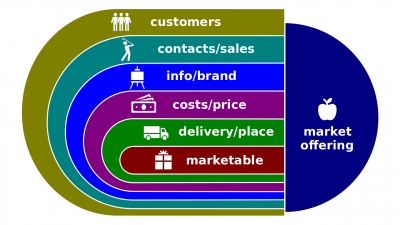Difference between revisions of "Market exchangeable"
(→Earned vs made vs purchased) |
|||
| Line 48: | Line 48: | ||
==Classifications== | ==Classifications== | ||
===Earned vs made vs purchased=== | ===Earned vs made vs purchased=== | ||
| − | :With regard to the way of its | + | :With regard to the way of its origin, a ''marketable'' can be one of the following: |
:#'''[[Work product]]''' or [[produced marketable]], which is made as a [[solution]] or component of a solution that is the primary result of a [[project]] or [[operations]]. In other words, a ''produced marketable'' is an article or substance that is produced and refined for sale. | :#'''[[Work product]]''' or [[produced marketable]], which is made as a [[solution]] or component of a solution that is the primary result of a [[project]] or [[operations]]. In other words, a ''produced marketable'' is an article or substance that is produced and refined for sale. | ||
:#'''Purchased item''' available for sale. | :#'''Purchased item''' available for sale. | ||
Revision as of 00:40, 28 May 2021
A marketable (alternatively known as a marketable product or, simply, product; the marketable that has already been marketed is also called a marketed entity) is anything that responding customers perceive as valuable to be entitled to, donate to, earn, hire, own, and/or trust to. Marketing offerings include:
- Benefits of a marketable for action, hire, or sale;
- Accessibility and affordability of those benefits; as well as
- Communication of the benefits, accessibility and affordability to their prospective customer.
The marketing offerings may increase or decrease the value of this marketable.
Trivia
Definitions
- According to Marketing Management by Keller and Kotler (15th edition),
- Product. Anything that can be offered to a market to satisfy a want or need, including physical goods, services, experiences, events, person, places, properties, organizations, information, and ideas.
- According to Managing Quality by Foster (6th edition),
- Product. A tangible good that is produced for a customer.
- According to Cost Accounting by Horngren, Datar, Rajan (14th edition),
- Product. Any output that has a positive total sales value (or an output that enables an organization to avoid incurring costs).
- According to the Marketing Communications by Fill (5th edition),
- Product. Anything that is capable of satisfying customer needs.
- According to the ITIL Foundation 4e by Axelos,
- Product. A configuration of an organization's resources designed to offer value for a consumer.
Product vs marketable
- Literally, product is anything that is produced. This term, product, has a wide range of applications:
- In business and marketing, product usually refers to the marketable that is produced by either an industrial process or farming to be sold and re-sold as a commodity.
- In business analysis, product may refer to work product that either business analysts produce or the customer seeks to obtain when their requirements are implemented.
- In effort administration, engineering, and project management, product usually refers to work product, so does this word, product, in the product backlog and product backlog item (PBI) terms.
- In mathematics, product is the result from the multiplication together of numbers or expressions.
- In social science, product is something or someone resulting from environment or a set of other conditions.
Classes
By the sought response, marketables can be classified in six classes.
Allowables
Doables
Hireables
Patronables
Saleables
- Item that can be sold or re-sold, as well as
- Entity that can serve as a not-for-sale source of the items that can be sold or re-sold.
In other words, marketable can be defined as anything which value on the market, status in a group, as well as favorable or unfavorable perception can decrease or increase.
Trustables
Classifications
Earned vs made vs purchased
- With regard to the way of its origin, a marketable can be one of the following:
- Work product or produced marketable, which is made as a solution or component of a solution that is the primary result of a project or operations. In other words, a produced marketable is an article or substance that is produced and refined for sale.
- Purchased item available for sale.
- Earned entity, which is not just a work product and cannot be sold itself, but is a not-for-sale source of the items that can be sold. These sources include communities, publicly-owned locations, governments, and people.
Intangible vs tangible
- With regard to its nature, a marketable can be one of the following:
- Intangible, which is something identifiable, but not tangible such as concepts, data, enterprises, events, experiences, ideas, information, labor, marketable permits, marketable securities and investment products, personal time, services, software, and any other non-physical property.
- Tangible, which is a physical good such as animals, buildings, hardware, land, produce, and any other physical property.
For-sale vs not-for-sale
- With regard to its nature, a marketable can be one of the following:
- For-sale
- Not-for-sale, which is anything that is not (such as publicly-owned locations or places) and/or cannot (such as communities, governments, and persons) be private properties.
Final vs Intermediate
- With regard to its users, a marketable can be one of the following:
Components
Assets for hire
- labor, personal time, capacity, labor and other resources for hire, as well as access to those resources.
Concept, idea
Credential, permit
Enterprise, organization
Event, experience
Financial products
Human(s)
- Community, group, person
Owned properties
- Private non-physical property such as software, data, information, patent
- Private physical properties such as animals, buildings, hardware, land, produce, durable physical goods (durables), and non-durable physical goods (consumables).
- Public properties such as government, police, military, publicly-owned locations
Service
Features
- Marketing mix. A model representing distinguishable components of any product, which must include a deliverable, product delivery, and product charge.
- Product scope. All the features and functions that characterize a product.
- Service. Work carried out or on behalf of others.
